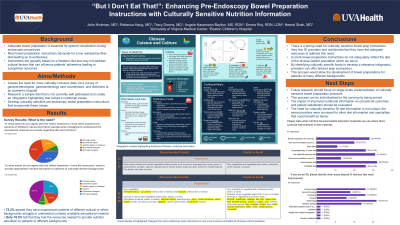Monday Poster Session
Category: Colorectal Cancer Prevention
P2145 - "But I Don’t Eat That!": Enhancing Pre-Endoscopy Bowel Preparation Instructions With Culturally Sensitive Nutrition Information
Monday, October 28, 2024
10:30 AM - 4:00 PM ET
Location: Exhibit Hall E

Has Audio
- JH
John Hickman, MD
University of Virginia Medical Center
Charlottesvilla, VA
Presenting Author(s)
John Hickman, MD1, Rebecca M. Haug, MD2, Tracy Downs, MD2, Angela Bayliss, MS, RDN3, Emma Roy, RD2, Neeral Shah, MD2
1University of Virginia Medical Center, Charlottesvilla, VA; 2University of Virginia Medical Center, Charlottesville, VA; 3University of Virginia Medical Centerm, Charlottesville, VA
Introduction: Adequate bowel preparation is essential for optimal visualization during endoscopic procedures. Most bowel preparation instructions advocate for a low residue/low fiber diet leading up to endoscopy. Instructions are typically based on a Western diet and may not address cultural factors that can influence patients' adherence leading to suboptimal outcomes. This study aims to assess health care provider needs for more patient specific instructions and develop culturally sensitive pre-endoscopy bowel preparation instructions. These instructions should hopefully reflect the diet of a diverse patient population to improve patient adherence thereby enhancing the quality of endoscopic examinations.
Methods: To assess for need, an online survey was distributed to all GI providers, care coordinators, and dieticians in an academic health system. As a pilot, a traditional Chinese diet was researched and compared to existing bowel prep instructions. Elements of this diet were then incorporated into existing available bowel prep instructions.
Results: 72.2% of those surveyed agreed that they have experienced patients of different cultural or ethnic backgrounds struggle to understand currently available prep instructions and only 19.5% felt they had the resources needed to provide nutrition education to patients of different backgrounds. An infographic representing traditional Chinese cuisine and cultural practices was created. This was used to update bowel preparation instructions to incorporate culturally appropriate dietary alternatives.
Discussion: Culturally sensitive bowel preparation instructions are vital for equitable healthcare. Current bowel preparation instructions do not adequately reflect the diet of the diverse patient population which we serve. By identifying culturally specific foods to develop a reference infographic, providers can offer tailored prep instructions. This process would allow the development of bowel preparations for patients of many different backgrounds. Future research should focus on larger-scale implementation of culturally sensitive bowel preparation protocols and evaluate their impact on procedural outcomes and patient experiences across diverse populations.
Disclosures:
John Hickman, MD1, Rebecca M. Haug, MD2, Tracy Downs, MD2, Angela Bayliss, MS, RDN3, Emma Roy, RD2, Neeral Shah, MD2. P2145 - “But I Don’t Eat That!”: Enhancing Pre-Endoscopy Bowel Preparation Instructions With Culturally Sensitive Nutrition Information, ACG 2024 Annual Scientific Meeting Abstracts. Philadelphia, PA: American College of Gastroenterology.
1University of Virginia Medical Center, Charlottesvilla, VA; 2University of Virginia Medical Center, Charlottesville, VA; 3University of Virginia Medical Centerm, Charlottesville, VA
Introduction: Adequate bowel preparation is essential for optimal visualization during endoscopic procedures. Most bowel preparation instructions advocate for a low residue/low fiber diet leading up to endoscopy. Instructions are typically based on a Western diet and may not address cultural factors that can influence patients' adherence leading to suboptimal outcomes. This study aims to assess health care provider needs for more patient specific instructions and develop culturally sensitive pre-endoscopy bowel preparation instructions. These instructions should hopefully reflect the diet of a diverse patient population to improve patient adherence thereby enhancing the quality of endoscopic examinations.
Methods: To assess for need, an online survey was distributed to all GI providers, care coordinators, and dieticians in an academic health system. As a pilot, a traditional Chinese diet was researched and compared to existing bowel prep instructions. Elements of this diet were then incorporated into existing available bowel prep instructions.
Results: 72.2% of those surveyed agreed that they have experienced patients of different cultural or ethnic backgrounds struggle to understand currently available prep instructions and only 19.5% felt they had the resources needed to provide nutrition education to patients of different backgrounds. An infographic representing traditional Chinese cuisine and cultural practices was created. This was used to update bowel preparation instructions to incorporate culturally appropriate dietary alternatives.
Discussion: Culturally sensitive bowel preparation instructions are vital for equitable healthcare. Current bowel preparation instructions do not adequately reflect the diet of the diverse patient population which we serve. By identifying culturally specific foods to develop a reference infographic, providers can offer tailored prep instructions. This process would allow the development of bowel preparations for patients of many different backgrounds. Future research should focus on larger-scale implementation of culturally sensitive bowel preparation protocols and evaluate their impact on procedural outcomes and patient experiences across diverse populations.
Disclosures:
John Hickman indicated no relevant financial relationships.
Rebecca Haug indicated no relevant financial relationships.
Tracy Downs indicated no relevant financial relationships.
Angela Bayliss indicated no relevant financial relationships.
Emma Roy indicated no relevant financial relationships.
Neeral Shah indicated no relevant financial relationships.
John Hickman, MD1, Rebecca M. Haug, MD2, Tracy Downs, MD2, Angela Bayliss, MS, RDN3, Emma Roy, RD2, Neeral Shah, MD2. P2145 - “But I Don’t Eat That!”: Enhancing Pre-Endoscopy Bowel Preparation Instructions With Culturally Sensitive Nutrition Information, ACG 2024 Annual Scientific Meeting Abstracts. Philadelphia, PA: American College of Gastroenterology.
